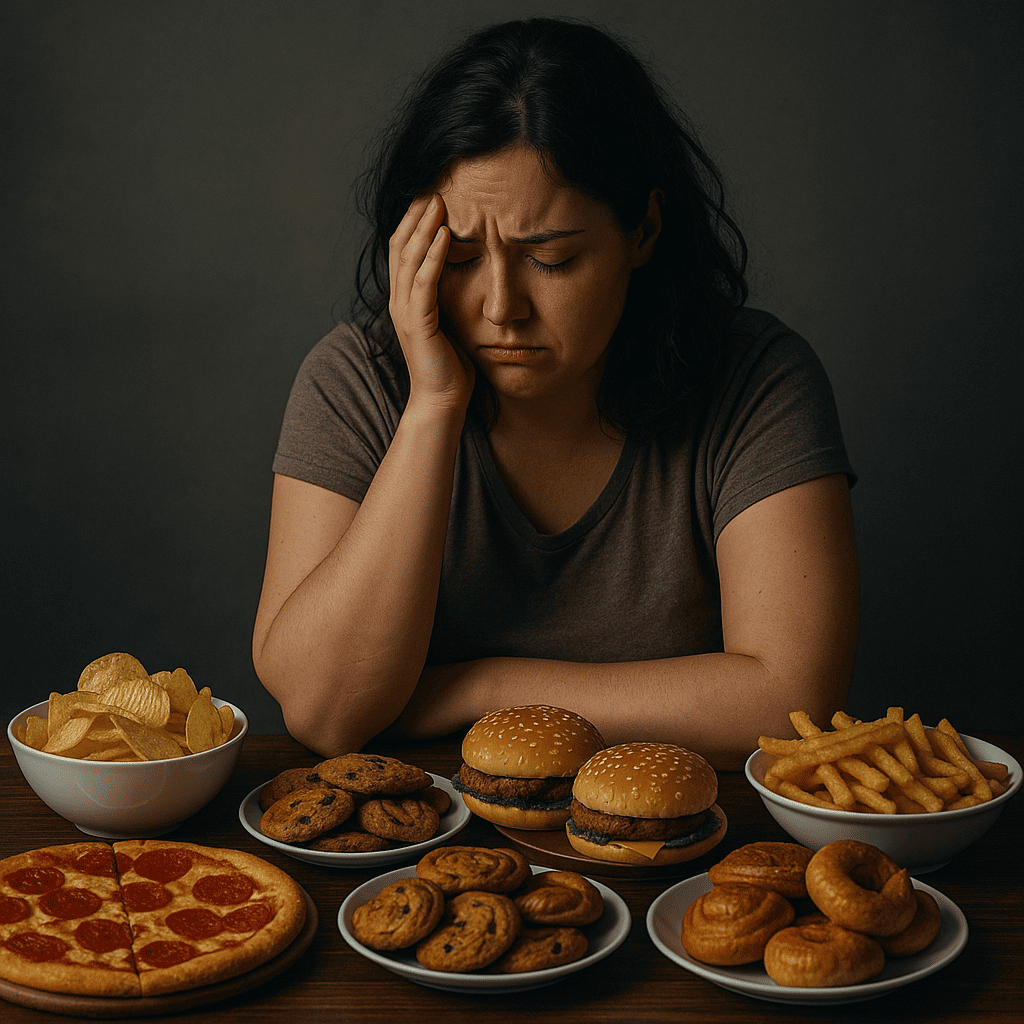Binge Eating Disorder: When Food Becomes a Battle
 Introduction
Introduction
Most of us have overeaten at some point—during a festival, wedding, or a weekend treat. But when episodes of uncontrollable eating become frequent, distressing, and secretive, it may point to something deeper: Binge Eating Disorder (BED). Recognized as a distinct mental health condition, BED is the most common eating disorder globally, yet remains one of the least talked about.
What is Binge Eating Disorder (BED)?
Binge Eating Disorder is characterized by recurrent episodes of eating large quantities of food in a short period, accompanied by a sense of loss of control—but without compensatory behaviors like vomiting or excessive exercise, which are seen in bulimia.
Unlike emotional overeating or occasional indulgences, BED causes significant psychological distress, shame, and often leads to obesity, diabetes, and depression if untreated.
Diagnostic Criteria (DSM-5)
To be diagnosed with BED, episodes must occur at least once a week for 3 months, and involve three or more of the following:
-
Eating more rapidly than usual
-
Eating until uncomfortably full
-
Eating large amounts of food when not hungry
-
Eating alone due to embarrassment
-
Feeling disgusted, depressed, or guilty afterward
Crucially, there is no regular purging behavior, which differentiates BED from bulimia.
Who is at Risk?
-
Gender: Affects both men and women, though often underdiagnosed in men
-
Adolescents & young adults: Especially during stressful transitions
-
People with history of dieting or body shaming
-
Individuals with mood or anxiety disorders
-
Genetic predisposition and trauma survivors
Symptoms and Warning Signs
Physical:
-
Weight gain or obesity
-
Fatigue, poor sleep
-
Metabolic complications: diabetes, high blood pressure
Emotional/Behavioral:
-
Feeling out of control during eating episodes
-
Eating alone or in secret
-
Shame, guilt, or self-loathing after bingeing
-
Avoidance of social events involving food
-
Co-occurring depression, anxiety, or body image dissatisfaction
Causes and Contributing Factors
Binge Eating Disorder is multifactorial, with contributions from:
-
Biology: Dopamine and serotonin imbalances affecting reward pathways
-
Psychology: Low self-esteem, perfectionism, emotional dysregulation
-
Sociocultural: Unrealistic body image ideals, fat-shaming, media influence
-
History of trauma or abuse: Particularly in childhood
In many cases, bingeing becomes a way to cope with distress, loneliness, boredom, or past hurt.
Treatment Options
A multi-disciplinary and compassionate approach is key:
1. Psychotherapy
-
CBT (Cognitive Behavioral Therapy): Gold standard; addresses unhelpful thoughts, emotional triggers, and helps regain control over eating
-
DBT (Dialectical Behavior Therapy): Helps with emotional regulation and distress tolerance
-
Interpersonal Therapy (IPT): Focuses on relationship-based triggers
2. Medication
-
Lisdexamfetamine: FDA-approved specifically for BED
-
SSRIs (e.g., fluoxetine, sertraline): Useful if there is comorbid depression
-
Topiramate: Sometimes used off-label for impulsivity and weight control
3. Nutrition Counseling
-
Guidance on structured, balanced eating
-
Breaking the binge–restrict cycle
-
Emphasis on non-judgmental eating and body acceptance
4. Support Groups and Peer Therapy
-
Helps reduce shame and isolation
-
Encourages long-term recovery through shared experience
Prognosis and Recovery
Recovery from BED is possible and sustainable, though relapses may occur.
-
Early treatment leads to better outcomes
-
Even without weight loss, psychological and metabolic benefits emerge with therapy
-
Key goals: reduction in binge frequency, improved self-esteem, and enhanced quality of life
Myths About Binge Eating Disorder
🔸 “Only overweight people have BED.”
Not true—BED affects people of all sizes, including those with normal or low BMI.
🔸 “It’s just a lack of willpower.”
No—it’s a psychiatric condition, not laziness or greed.
🔸 “Dieting will solve the problem.”
In fact, dieting may worsen BED by triggering more restrictive–binge cycles.
What Can Families Do?
-
Avoid criticizing weight or appearance
-
Focus on emotions and behavior, not food alone
-
Encourage seeking professional help without shame
-
Be patient—recovery is a journey
Conclusion: More Than Just Eating
Binge Eating Disorder is not about gluttony. It’s about pain, unmet needs, and emotional conflict expressed through food. Treatment involves more than controlling food—it’s about healing the mind–body disconnect, fostering self-compassion, and building a life where food is fuel, not punishment.
Need Help?
Dr. Srinivas Rajkumar T, MD (AIIMS, New Delhi)
Consultant Psychiatrist
Apollo Clinic, Opp. Phoenix Marketcity, Velachery, Chennai
📞 85951 55808
🌐 srinivasaiims.com